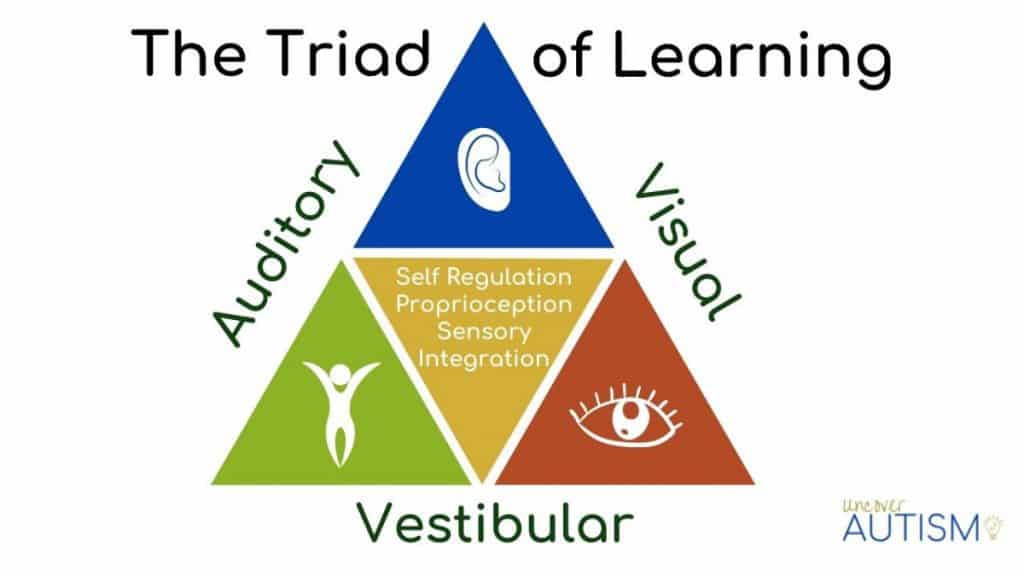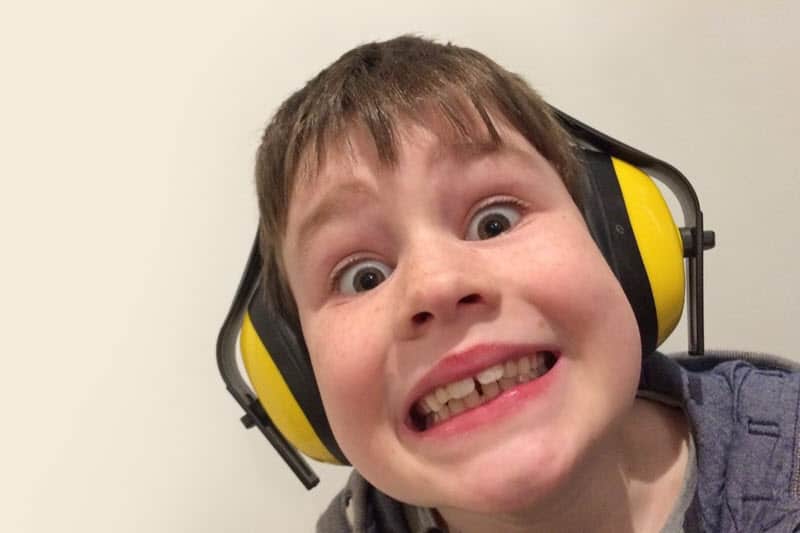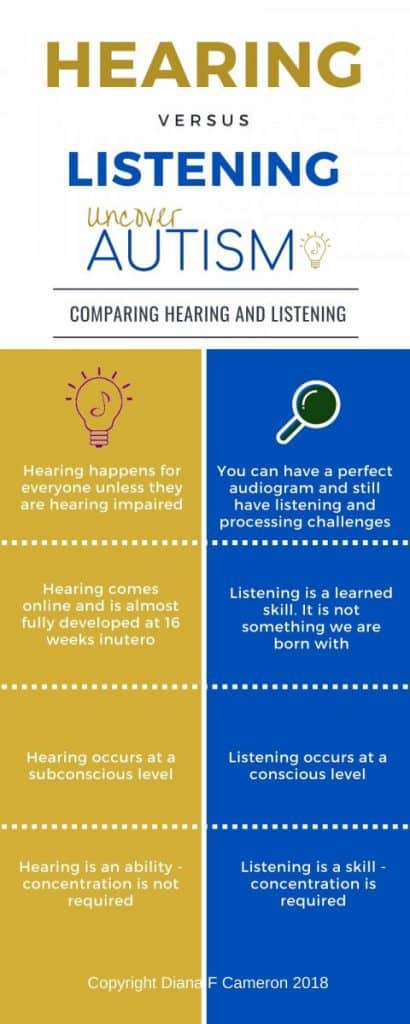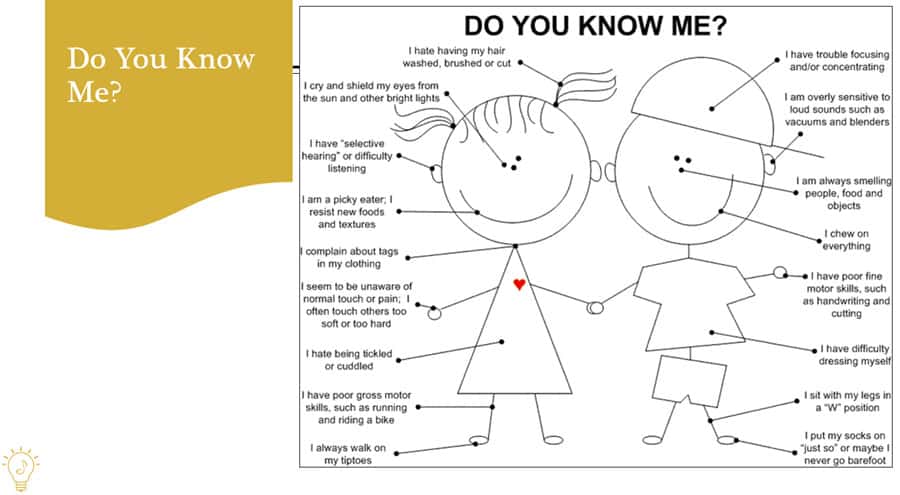What are auditory processing challenges? Auditory processing is what the brain does with what it hears. Our bodies and ears never stop processing sound input as we are unable to shut off the auditory system, but it is the brain that registers and interprets the sound in preparation for formulating a response. A deficit in processing skills can lead to a range of learning challenges including poor comprehension, reading, learning, poor muscle control and organizational skills.
It has been my experience that an extremely high percentage of children with autism also have auditory processing challenges – it just goes with the territory. In fact, many people often mistake auditory processing symptoms as those of autism, when in fact they are signs of auditory processing disorder.
An extremely high percentage of children with autism also have auditory processing challenges. Many people often mistake auditory processing symptoms as those of autism, when in fact they are signs of auditory processing disorder.
Diana F Cameron
What Part Does the Auditory System Play?
Let’s look at what I call the Triad of Learning. The triad has three main systems that collide with and are held together with our sensory system. These systems do not work independently of each other and while most are responsible for certain tasks, other systems play a part in how they operate.
We have all heard of the term “multi-sensory learning”. This is how children learn best because all these systems are emerging and how young children interpret the world around them. Each of these systems are essential, and while one system can become heightened in the total absence of another (for example if a child is born without sight, their auditory system will be much more acute), if there are skills not acquired or missing from one or more system, there will be deficits in learning.
Another example is a child that is born without hearing, or compromised hearing. While technology has come a long way in cochlea implants, speech is always challenged when the auditory system is down.
We have twelve essential auditory skills and when one or more has not developed, we see skills that are compromised.

The three main systems are:
- Auditory
- Visual and
- Vestibular
Although each system is responsible for different things individually, they all interact together in the way children learn.
With each of these, inputs may be from various parts of the body, but the interpretation of this input is done in various parts of the brain.
Most people don’t realize that sound comes in through our ears but also our entire skeletal body. Have you ever seen a person with significant hearing loss tap their foot in time to music? Have you ever seen someone put their feet on a speaker to experience the music in a different way?
Sound travels through our entire skeleton as well as in through our ears. There are 2 types of conduction:
- air conduction (through the ears) and
- bone conduction (through the skeletal structure)
If you have ever wondered why your voice sounds different on a recording than it does to you, it is because you are processing that sound with both air and bone conduction when you speak. When it is recorded, you only hear it through air conduction.
Why Do We Need to Be Able To Process Sound to Learn?
Often a child with autism doesn’t appear to be listening to you. It is because his brain is busy trying to convert messages that are coming at him faster than he can make sense of them.
If information is coming into the brain but the brain does not have the process working correctly to interpret, it is like trying to put together a 1,000 piece puzzle when someone has just thrown all the pieces at you.
Imagine you asking your child with autism to do something. They look at you blankly. You repeat what you just said but they still look at your blankly. Did they hear you? Are they just not listening?
With you or I, the information goes in, the brain has a very effective system for interpreting, categorizing, sorting, storing and recalling that enables us to process the request and formulate a response.
Often a child with autism doesn’t appear to be listening but the brain is busy trying to convert messages that are coming faster than it can make sense of them.
diana f cameron
But for a child with autism, the information goes in, breaks into 1,000 pieces, and the brain is busy trying to put pieces together and work out what fits with what, unable to recall correctly because things haven’t previously been stored correctly. The “filing system” in the brain is a mess and while they struggle to put it all together and work out what you are wanting to formulate a response, you have moved on and spoken 3 different sentences in the meantime.
It is incredibly exhausting for a child with autism to live in a world where their brain is always trying to play catch up, and with a brain that naturally focusses on details, is it any wonder they end up stimming and fixating?

How Does Processing Sound Help With Certain Behaviors?
Auditory processing challenges can manifest in challenges to learning and growing that most people don’t recognize.
Low muscle tone can be directly related to not processing low sounds correctly. Similarly, tight muscles can be the same which can often be seen in the toe walking common among some children with ASD.
Speech difficulties and acquiring speech (which is often slow with children with autism) is directly related to not processing sounds between 3,000-4,000Hz which is where the majority of our speech sits.
Lack of processing high sounds (4,000Hz+) can lead to be lethargic and having low energy.
It is even possible to improve functions like toilet training when the processing of sound is improved.
The correct processing of sound has a direct impact on how anyone learns (children and adults alike). It also plays a major part in our social interactions and our mental and emotional state.
That is why I have found sound therapy with specifically psychoacoustically modified music so powerful in helping children with autism learn more easily.
Sound is powerful and when used in the right way, it can change neural wiring and open doors to learning more quickly than anything else I have seen.
Listening is Different to Hearing

Many people think that processing sound is the same as hearing but it entails a total of 13 individual skills, all working together. Hearing is something everyone can do (unless we have a hearing loss).
Hearing is passive but listening is active and a learned skill. Some people do it well, some people are not very good at it.
Listening requires the brain to do something with the sound input it has received. Without that chain of processes, we would not be able to formulate a response.
Children with auditory pressing challenges usually appear not to be hearing you when you ask them something.
Getting an audiogram is a wonderful place to start just to make sure there is no hearing loss, but it is common for children with CAPD to have perfect audiograms.
Symptoms of Auditory Processing Challenges
Sensory challenges and auditory processing difficulties go hand in hand. Sensory issues can often be helped by learning to process sounds more effectively.
It can also manifest in other ways like not being able to organize themselves in space, being clumsy or uncoordinated, having a monotone voice, being very literal.
Have a look at the Do You Know Me visual, and you might see some things that you recognize about your child.
- Has difficulty listening and paying attention
- Misunderstands spoken information, directions, or questions
- Frequently asks “huh?” or “what?”
- Needs to have directions or information repeated
Has poor auditory sequential memory - Is easily distracted by background noise
- Finds some sounds uncomfortable or painful
- Has trouble hearing similarities and differences in sounds
- Has poor phonics skills


